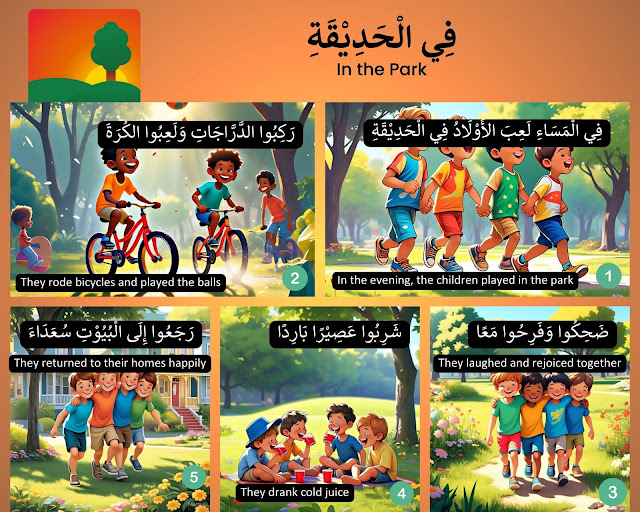Learning Arabic Through a Short Story: An Afternoon in the Park|فِي الْحَدِيْقَةِ
Welcome! This lesson uses a simple short story to help you learn Arabic. We will explore new vocabulary, understand how words change (known as صرف - ṣarf), and learn how sentences are built (known as نحو - naḥw). This method is excellent for beginners who want to see the language in action.
1. The Story: An Afternoon Adventure
Let's start by reading the story in Arabic, followed by its English translation.
النص (The Text):
فِي الْمَسَاءِ لَعِبَ الأَوْلَادُ فِي الْحَدِيْقَةِ
رَكِبُوا الدَّرَّاجَاتِ وَلَعِبُوا الكُرَةَ
ضَحِكُوا وَفَرِحُوا مَعًا
شَرِبُوا عَصِيْرًا بَارِدًا
رَجَعُوا إِلَى الْبُيُوْتِ سُعَدَاءَ
الترجمة (The Translation):
In the evening, the children played in the park.
They rode bicycles and played the ball.
They laughed and rejoiced together.
They drank cold juice.
They returned to their homes happily.
2. Sentence-by-Sentence Analysis
Now, let's break down each sentence to understand its components.
Sentence 1:
فِي الْمَسَاءِ لَعِبَ الأَوْلَادُ فِي الْحَدِيْقَةِ
(In the evening, the children played in the park.)
A. Word Analysis (المفردات والصرف - Vocabulary and Morphology):
فِي
Meaning: in
Part of speech: preposition (حَرْفُ جَرٍّ - ḥarf jarr)
الْمَسَاءِ (from مَسَاءٌ - masā')
Meaning: the evening
Part of speech: noun (اِسْم - ism)
Singular: مَسَاءٌ (masā') - evening
Plural: أَمْسِيَةٌ (amsiyah) - evenings
لَعِبَ
Meaning: played
Part of speech: verb (فِعْل - fiʿl)
Form: Past tense (فِعْل مَاضٍ - fiʿl māḍī), 3rd person masculine singular.
Root Forms:
Past (الماضي - al-māḍī): لَعِبَ (laʿiba) - he played
Present (المضارع - al-muḍāriʿ): يَلْعَبُ (yalʿabu) - he plays
Verbal Noun (المصدر - al-maṣdar): لَعِبٌ (laʿibun) - playing
Active Participle (اسم الفاعل - ism al-fāʿil): لاَعِبٌ (lāʿibun) - player
Passive Participle (اسم المفعول - ism al-mafʿūl): مَلْعُوبٌ (malʿūbun) - played (thing)
الأَوْلَادُ (from وَلَدٌ - walad)
Meaning: the children
Part of speech: noun (اِسْم - ism), plural.
Singular: وَلَدٌ (walad) - boy/child
Plural: أَوْلاَدٌ (awlād) - boys/children
فِي
Meaning: in
Part of speech: preposition (حَرْفُ جَرٍّ - ḥarf jarr)
الْحَدِيْقَةِ (from حَدِيْقَةٌ - ḥadīqah)
Meaning: the park/garden
Part of speech: noun (اِسْم - ism), feminine singular.
Singular: حَدِيْقَةٌ (ḥadīqah) - garden
Plural: حَدائِقُ (ḥadā'iq) - gardens
B. Sentence Structure and Syntax (النحو والإعراب - Grammar and Syntactic Analysis):
Type: This is a verbal sentence (جُمْلَة فِعْلِيَّة - jumlah fiʿliyyah) because it starts with a verb (لَعِبَ).
Structure: Adverbial phrase (time) + Verb + Subject + Adverbial phrase (place).
(شِبْهُ جُمْلَة + فِعْل + فَاعِل + شِبْهُ جُمْلَة)
Analysis (إعراب - iʿrāb):
فِي الْمَسَاءِ: Prepositional phrase (شِبْهُ جُمْلَة - shibhu jumlah from حَرْف جَرّ + اِسْم مَجْرُور). It acts as an adverb of time (ظَرْف زَمَان - ẓarf zamān).
فِي: preposition (حَرْفُ جَرٍّ).
الْمَسَاءِ: noun, genitive case (اِسْم مَجْرُور - ism majrūr) because it follows a preposition. The sign of the genitive case is the kasrah (ـِ) vowel sound.
لَعِبَ: Past tense verb (فِعْل مَاضٍ). This is the main verb of the sentence.
الأَوْلَادُ: Noun, subject (فَاعِل - fāʿil) of the verb لَعِبَ. It is in the nominative case (مَرْفُوع - marfūʿ). The sign of the nominative case is the ḍammah (ـُ) vowel sound.
فِي الْحَدِيْقَةِ: Prepositional phrase (شِبْهُ جُمْلَة). It acts as an adverb of place (ظَرْف مَكَان - ẓarf makān).
فِي: preposition (حَرْفُ جَرٍّ).
الْحَدِيْقَةِ: noun, genitive case (اِسْم مَجْرُور). The sign of the genitive case is the kasrah (ـِ).
Sentence 2:
رَكِبُوا الدَّرَّاجَاتِ وَلَعِبُوا الكُرَةَ
(They rode bicycles and played the ball.)
A. Word Analysis (المفردات والصرف):
رَكِبُوا
Meaning: they rode
Part of speech: verb (فِعْل - fiʿl)
Form: Past tense (فِعْل مَاضٍ), 3rd person masculine plural. The 'وا' (wāw al-jamāʿah) suffix indicates 'they'.
Root Forms:
Past (الماضي): رَكِبَ (rakiba) - he rode
Present (المضارع): يَرْكَبُ (yarkabu) - he rides
Verbal Noun (المصدر): رُكوبٌ (rukūbun) - riding
Active Participle (فاعل): راكِبٌ (rākibun) - rider
Passive Participle (مفعول): مَرْكُوبٌ (markūbun) - ridden (thing)
الدَّرَّاجَاتِ (from دَرَّاجَةٌ - darrājah)
Meaning: the bicycles
Part of speech: noun (اِسْم - ism), sound feminine plural (جَمْع مُؤَنَّث سَالِم - jamʿ mu'annath sālim).
Singular: دَرَّاجَةٌ (darrājah) - bicycle
Plural: دَرَّاجَاتٌ (darrājāt) - bicycles
وَ
Meaning: and
Part of speech: conjunction particle (حَرْفُ عَطْفٍ - ḥarf ʿaṭf)
لَعِبُوا
Meaning: they played
Part of speech: verb (فِعْل - fiʿl)
Form: Past tense (فِعْل مَاضٍ), 3rd person masculine plural. The 'وا' suffix indicates 'they'.
Root Forms: (See Sentence 1)
الكُرَةَ (from كُرَةٌ - kurah)
Meaning: the ball
Part of speech: noun (اِسْم - ism), feminine singular.
Singular: كُرَةٌ (kurah) - ball
Plural: كُرَاتٌ (kurāt) - balls
B. Sentence Structure and Syntax (النحو والإعراب):
Type: This is a compound sentence (جُمْلَة مُرَكَّبَة - jumlah murakkabah), linking two verbal clauses with 'و'.
Structure: [Verb + Subject (implied in verb) + Object] + Conjunction + [Verb + Subject (implied in verb) + Object].
Analysis (إعراب):
رَكِبُوا: Past tense verb (فِعْل مَاضٍ).
The 'وا' (wāw al-jamāʿah) is an attached pronoun (ضَمِير مُتَّصِل - ḍamīr muttaṣil) acting as the subject (فَاعِل), in the nominative position (فِي مَحَلِّ رَفْع - fī maḥalli rafʿ).
الدَّرَّاجَاتِ: Noun, direct object (مَفْعُول بِهِ - mafʿūl bihi) of the verb رَكِبُوا. It is in the accusative case (مَنْصُوب - manṣūb). The sign of the accusative case for sound feminine plurals is kasrah (ـِ).
وَ: Conjunction particle (حَرْفُ عَطْفٍ).
لَعِبُوا: Past tense verb (فِعْل مَاضٍ).
The 'وا' (wāw al-jamāʿah) is the subject (فَاعِل), an attached pronoun in the nominative position.
الكُرَةَ: Noun, direct object (مَفْعُول بِهِ) of the verb لَعِبُوا. It is in the accusative case (مَنْصُوب). The sign of the accusative case is fatḥah (ـَ).
Sentence 3:
ضَحِكُوا وَفَرِحُوا مَعًا
(They laughed and rejoiced together.)
A. Word Analysis (المفردات والصرف):
ضَحِكُوا
Meaning: they laughed
Part of speech: verb (فِعْل - fiʿl)
Form: Past tense (فِعْل مَاضٍ), 3rd person masculine plural ('وا').
Root Forms:
Past (الماضي): ضَحِكَ (ḍaḥika) - he laughed
Present (المضارع): يَضْحَكُ (yaḍḥaku) - he laughs
Verbal Noun (المصدر): ضَحِكٌ (ḍaḥikun), ضِحْكٌ (ḍiḥkun) - laughter
Active Participle (فاعل): ضَاحِكٌ (ḍāḥikun) - laughing (person)
Passive Participle (مفعول): مَضْحُوكٌ (مِنْهُ/عَلَيْهِ) (maḍḥūkun (minhu/ʿalayhi)) - laughed at
وَ
Meaning: and
Part of speech: conjunction particle (حَرْفُ عَطْفٍ)
فَرِحُوا
Meaning: they rejoiced / were happy
Part of speech: verb (فِعْل - fiʿl)
Form: Past tense (فِعْل مَاضٍ), 3rd person masculine plural ('وا').
Root Forms:
Past (الماضي): فَرِحَ (fariḥa) - he rejoiced
Present (المضارع): يَفْرَحُ (yafraḥu) - he rejoices
Verbal Noun (المصدر): فَرَحٌ (faraḥun) - joy, happiness
Active Participle (فاعل): فَرِحٌ (fariḥun), فَرْحَانُ (farḥānu) - happy, joyful
Passive Participle (مفعول): مَفْرُوحٌ (بِهِ) (mafrūḥun (bihi)) - rejoiced about
مَعًا
Meaning: together
Part of speech: Adverb (ظَرْف - ẓarf), specifically an adverb of manner (حَال - ḥāl).
B. Sentence Structure and Syntax (النحو والإعراب):
Type: Compound verbal sentence (جُمْلَة فِعْلِيَّة مُرَكَّبَة).
Structure: [Verb + Subject (implied)] + Conjunction + [Verb + Subject (implied)] + Adverb of manner.
Analysis (إعراب):
ضَحِكُوا: Past tense verb (فِعْل مَاضٍ). The 'وا' is the subject (فَاعِل).
وَ: Conjunction particle (حَرْفُ عَطْفٍ).
فَرِحُوا: Past tense verb (فِعْل مَاضٍ). The 'وا' is the subject (فَاعِل).
مَعًا: Adverb of manner (حَال - ḥāl), describing how they laughed and rejoiced. It is in the accusative case (مَنْصُوب). The sign is the fatḥah (actually fatḥatān / tanwīn fatḥ ـً).
Sentence 4:
شَرِبُوا عَصِيْرًا بَارِدًا
(They drank cold juice.)
A. Word Analysis (المفردات والصرف):
شَرِبُوا
Meaning: they drank
Part of speech: verb (فِعْل - fiʿl)
Form: Past tense (فِعْل مَاضٍ), 3rd person masculine plural ('وا').
Root Forms:
Past (الماضي): شَرِبَ (shariba) - he drank
Present (المضارع): يَشْرَبُ (yashrabu) - he drinks
Verbal Noun (المصدر): شُرْبٌ (shurbun) - drinking
Active Participle (فاعل): شَارِبٌ (shāribun) - drinker
Passive Participle (مفعول): مَشْرُوبٌ (mashrūbun) - drunk (thing), drink
عَصِيْرًا (from عَصِيْرٌ - ʿaṣīr)
Meaning: a juice
Part of speech: noun (اِسْم - ism), singular.
Singular: عَصِيْرٌ (ʿaṣīr) - juice
Plural: عَصَائِرُ (ʿaṣā'ir) - juices
بَارِدًا (from بَارِدٌ - bārid)
Meaning: cold (adjective)
Part of speech: adjective (نَعْت - naʿt or صِفَة - ṣifah), masculine singular.
Singular: بَارِدٌ (bārid) - cold
Plural: (depends on what it describes, e.g., بَارِدُوْن for people)
B. Sentence Structure and Syntax (النحو والإعراب):
Type: Verbal sentence (جُمْلَة فِعْلِيَّة).
Structure: Verb + Subject (implied) + Object + Adjective modifying the object.
Analysis (إعراب):
شَرِبُوا: Past tense verb (فِعْل مَاضٍ). The 'وا' is the subject (فَاعِل).
عَصِيْرًا: Noun, direct object (مَفْعُول بِهِ) of شَرِبُوا. It is indefinite (note the tanwīn ـً) and in the accusative case (مَنْصُوب). The sign is fatḥatān (ـً). This noun is described by the following adjective, so it's the مَنْعُوت (manʿūt).
بَارِدًا: Adjective (نَعْت - naʿt) describing عَصِيْرًا. It must agree with the noun it describes (منعوت) in four aspects: definiteness (both indefinite), gender (both masculine), number (both singular), and case (both accusative). It is in the accusative case (مَنْصُوب), signed by fatḥatān (ـً).
Sentence 5:
رَجَعُوا إِلَى الْبُيُوْتِ سُعَدَاءَ
(They returned to their homes happily.)
A. Word Analysis (المفردات والصرف):
رَجَعُوا
Meaning: they returned
Part of speech: verb (فِعْل - fiʿl)
Form: Past tense (فِعْل مَاضٍ), 3rd person masculine plural ('وا').
Root Forms:
Past (الماضي): رَجَعَ (rajaʿa) - he returned
Present (المضارع): يَرْجِعُ (yarjiʿu) - he returns
Verbal Noun (المصدر): رُجُوعٌ (rujūʿun) - returning
Active Participle (فاعل): رَاجِعٌ (rājiʿun) - returning (person)
Passive Participle (مفعول): مَرْجُوعٌ (إِلَيْهِ) (marjūʿun (ilayhi)) - returned to
إِلَى
Meaning: to
Part of speech: preposition (حَرْفُ جَرٍّ)
الْبُيُوْتِ (from بَيْتٌ - bayt)
Meaning: the homes
Part of speech: noun (اِسْم - ism), plural.
Singular: بَيْتٌ (bayt) - house, home
Plural: بُيُوتٌ (buyūt) - houses, homes
سُعَدَاءَ (from سَعِيْدٌ - saʿīd)
Meaning: happy (plural adjective used as an adverb here)
Part of speech: adjective (نعت) acting as adverb of manner (حال).
Singular: سَعِيْدٌ (saʿīd) - happy (m.)
Plural: سُعَدَاءُ (suʿadā') - happy (plural)
B. Sentence Structure and Syntax (النحو والإعراب):
Type: Verbal sentence (جُمْلَة فِعْلِيَّة).
Structure: Verb + Subject (implied) + Prepositional Phrase + Adverb of manner (state).
Analysis (إعراب):
رَجَعُوا: Past tense verb (فِعْل مَاضٍ). The 'وا' is the subject (فَاعِل).
إِلَى الْبُيُوْتِ: Prepositional phrase (شِبْهُ جُمْلَة).
إِلَى: preposition (حَرْفُ جَرٍّ).
الْبُيُوْتِ: noun, genitive case (اِسْم مَجْرُور) because it follows إِلَى. The sign is kasrah (ـِ).
سُعَدَاءَ: Adverb of manner (حَال - ḥāl), describing the state of the subject ('they') upon returning. It is in the accusative case (مَنْصُوب). The sign is fatḥah (ـَ). (Note: Although the base plural form ends in ḍammah - سُعَدَاءُ, when used as a ḥāl or in other accusative situations, this type of plural takes a fatḥah).
3. Conclusion
By studying this story, you’ve learned:
Vocabulary: Common nouns (e.g., حَدِيْقَةٌ) and verbs (e.g., لَعِبَ).
Morphology (صرف): Verb conjugation and noun pluralization.
Syntax (نحو): Structure of verbal sentences and adverbial phrases.
By breaking down this short story, we've practiced recognizing vocabulary, understanding how nouns and verbs change (صرف - ṣarf), and analyzing sentence structure (نحو - naḥw). We saw how verbs indicate the subject (like the 'وا' for 'they'), how nouns change for plural and case, how adjectives agree with nouns, and how different parts form a complete sentence (like verbal sentences, prepositional phrases, and adverbs of manner).
Keep practicing with short stories like this one. It's a fantastic way to build your Arabic skills step by step! Practice writing similar sentences, and soon you’ll master Arabic grammar step by step!





No comments:
Post a Comment